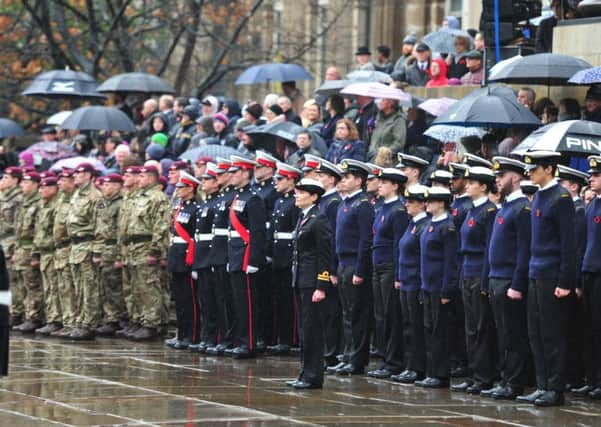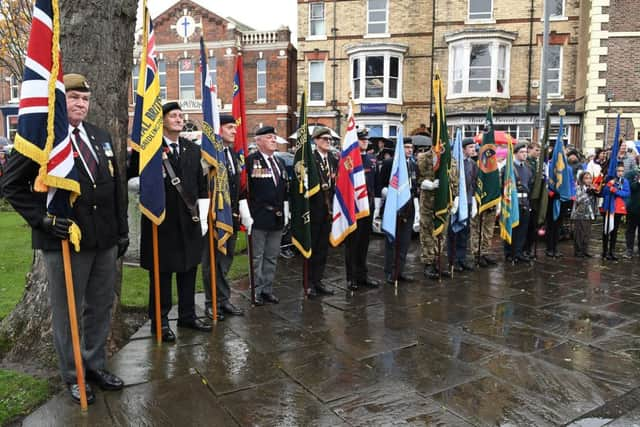How Remembrance Sunday can remain relevant for new generations: Andrew Vine


He’d been fascinated by the story unfolding in lessons, and wanted to know more before visiting the Thiepval Memorial on the Somme and the Menin Gate, in Ypres, with their tens of thousands of names of the fallen inscribed on the stonework.
Advertisement
Hide AdAdvertisement
Hide AdA few days later, he confessed that a passage in one of the books, Forgotten Voices of The Somme, by Joshua Levine, had made him cry. When he’d taken it in to share with classmates, they wept too.


It was the testimony of Corporal Don Murray, 23, from Bradford, who went over the top on the battle’s opening day, July 1, 1916, with the King’s Own Yorkshire Light Infantry.
He was 80 when he recalled what had happened in an interview for the Imperial War Museum in 1973, but his words have such immediacy that they might have been spoken only moments ago.
Advertisement
Hide AdAdvertisement
Hide Ad“All I could see were men lying dead, men screaming, men on the barbed wire shrieking, and I thought, ‘What can I do?’ I was alone in a hell of fire, and smoke, and stink.”
There is much more, but in these couple of sentences is the answer to the question anyone who has visited the battlefields and memorials invariably asks themselves: “What must it have been like?”
Don Murray eventually reached the relative safety of the British trenches. Of the 1,060 men in his battalion who attacked that morning, only 43 made it back.
His friends and comrades who never returned, whose names on the stonework bear eternal witness to the horror of war, will be in the thoughts of that class of Yorkshire teenagers tomorrow and the next day.
Advertisement
Hide AdAdvertisement
Hide AdSo will the other ghosts of the Somme who haunt Yorkshire’s collective memory – the volunteer Pals battalions, the friends and workmates of Leeds. Bradford, Barnsley, Sheffield and Hull who joined up together and were cut down.
Visiting where they fell, and reading the words of the survivors, has brought Remembrance Sunday alive for the students. The poppy has become the most vivid of symbols, and the two-minute silence the opportunity to pay homage to the sacrifice of those who gave everything.
That they shed tears for those lost a century and more ago is heartening for the way our country remembers the fallen.
Remembrance has to be renewed for each generation. The stories have to be retold and their significance explained, especially as the years silence living testimony.
Advertisement
Hide AdAdvertisement
Hide AdMy generation heard it first-hand. We had great-grandfathers who had fought in the trenches, grandfathers or fathers who had served in the Second World War and mothers who recalled the privations and dangers of life on the home front such as the murderous bombing of Hull in the spring of 1941 that killed nearly 1,200.
Thanks to their stories, we grew up learning about what had happened and what it meant almost without realising. They had mementos and photographs that brought it all to life.
The soldiers liberating Europe or the sailors braving U-boat attacks in the Atlantic to keep Britain fed who we learned about in history lessons turned out to be our dads.
Because the experience of war was so personal to our families, remembrance was scrupulously observed and the importance of doing so taken for granted. It was simply unthinkable not to take part.
Advertisement
Hide AdAdvertisement
Hide AdIt isn’t the same for young people now. It can’t be. There are hardly any living links to war among the families of the teenagers touched by Don Murray’s story and none to his generation, which has passed into history.
Inevitably, the two world wars that affected this country so profoundly feel much more distant to them. It can be hard to visualise the serried ranks of names carved on memorials as individuals who lived, loved and had hopes for the future.
But the necessity of remembrance has not changed from generation to generation. It’s just that now we all need to work that bit harder to ensure that it remains at the forefront of minds at this time of year, fostering a respect and appreciation for the fallen not just of the distant past but of today.
Witness this year’s push by the Royal British Legion urging people to turn off their mobile devices for two minutes and observe a silence instead. They shouldn’t really need to be nudged towards doing so, but if that’s what it takes to get them thinking, then so be it.
Advertisement
Hide AdAdvertisement
Hide AdAnniversaries can provide the spur to stop and reflect, as has been evident during the solemn and heartfelt commemorations in recent years of milestones of the Great War, or the 75th anniversary of the D Day landings.
Monday brings another milestone – the 100th anniversary of Britain first falling silent for two minutes at the 11th hour of the 11th day of the 11th month to mark the Armistice.
September marked the 80th anniversary of the Second World War beginning, and next year will see commemorations of both Dunkirk and the Battle of Britain.
Of course tomorrow and Monday are not only about the world wars.
Advertisement
Hide AdAdvertisement
Hide AdRemembrance is about all the fallen, in conflicts of our own time, like Afghanistan and Iraq, as well as those of the latter half of the 20th century, such as Korea and the Falklands.
And this year’s announcement that the poppy is also being worn for the civilian victims of war and terrorism is a fitting renewal of our national act of remembrance that should touch the hearts of all.
As long as our young people have the compassion and goodness to be moved to tears by a recollection from a century ago, as well as by the cruelties of today, remembrance will be honoured as it should be.